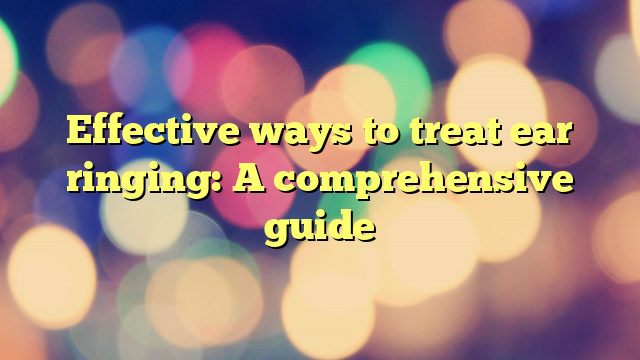Are you constantly bothered by a persistent ringing or buzzing sound in your ears? This condition, known as tinnitus, can be frustrating and disruptive to your daily life. Fortunately, there are effective ways to treat ear ringing that can help alleviate your symptoms and improve your quality of life. In this comprehensive guide, we will explore various treatment options and strategies to manage tinnitus.
1. Identify the Underlying Cause
The first step in treating ear ringing is to identify the underlying cause of your tinnitus. Tinnitus can be caused by a variety of factors, including exposure to loud noises, ear infections, and age-related hearing loss. By determining the root cause of your tinnitus, you can better tailor your treatment approach.
2. Manage Stress and Anxiety
Stress and anxiety can exacerbate tinnitus symptoms, making the ringing in your ears seem louder and more persistent. By practicing relaxation techniques such as deep breathing, meditation, and yoga, you can help reduce your stress levels and improve your tinnitus symptoms.
3. Avoid Loud Noise Exposure
Loud noises can damage the delicate hair cells in your inner ear, leading to tinnitus. To prevent further hearing damage and reduce tinnitus symptoms, it is important to avoid exposure to loud noises such as concerts, power tools, and firearms.
4. Use Sound Therapy
Sound therapy, also known as white noise therapy, can help mask the ringing in your ears and provide relief from tinnitus symptoms. You can use white noise machines, fans, or relaxation CDs to create a soothing background noise that can help distract you from your tinnitus.
5. Try Acupuncture or Massage Therapy
Some individuals with tinnitus have found relief through alternative therapies such as acupuncture or massage therapy. These holistic treatments can help improve blood flow to the ears and reduce tension in the muscles surrounding the auditory system, potentially alleviating tinnitus symptoms.
6. Consult with a Hearing Specialist
If your tinnitus symptoms persist despite trying various home remedies and treatments, it may be beneficial to consult with a hearing specialist or audiologist. They can conduct a thorough evaluation of your hearing and recommend personalized treatment options, such as hearing aids or tinnitus retraining therapy.
Conclusion
In conclusion, ear ringing can be a bothersome and persistent condition that can significantly impact your quality of life. However, by identifying the underlying cause of your tinnitus and implementing various treatment strategies such as stress management, sound therapy, and alternative therapies, you can effectively manage your symptoms and improve your overall well-being. Remember to consult with a hearing specialist if your tinnitus symptoms persist, as they can provide personalized treatment recommendations based on your specific needs.
FAQs
Q: Can tinnitus be cured?
A: While there is currently no cure for tinnitus, there are various treatment options and strategies that can help manage and reduce tinnitus symptoms.
Q: Is tinnitus a sign of a more serious medical condition?
A: In some cases, tinnitus can be a symptom of an underlying medical condition such as hearing loss, ear infections, or Meniere's disease. It is important to consult with a healthcare professional to rule out any serious underlying causes of your tinnitus.
Q: Are there any medications that can help with tinnitus?
A: Some medications such as antidepressants, antianxiety drugs, and anticonvulsants have been used to help manage tinnitus symptoms. However, the effectiveness of these medications can vary from person to person, and they may come with potential side effects.
Unlock the Secret to a Peaceful Life



